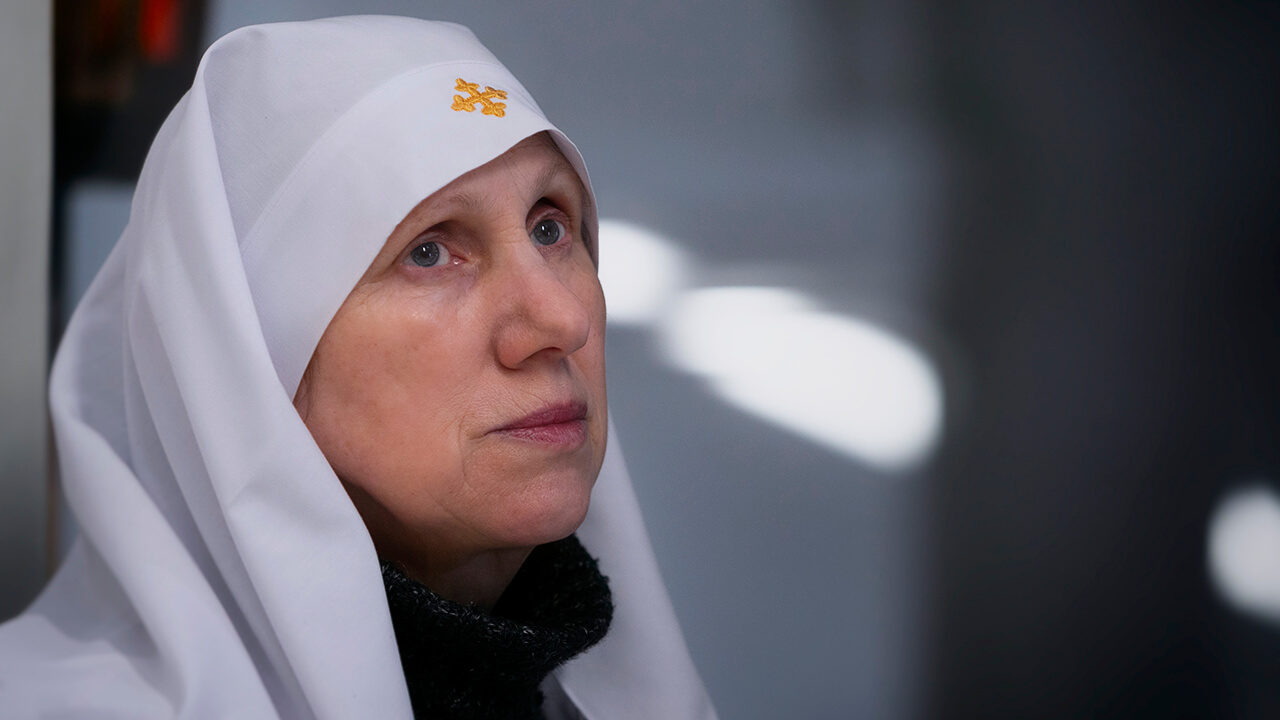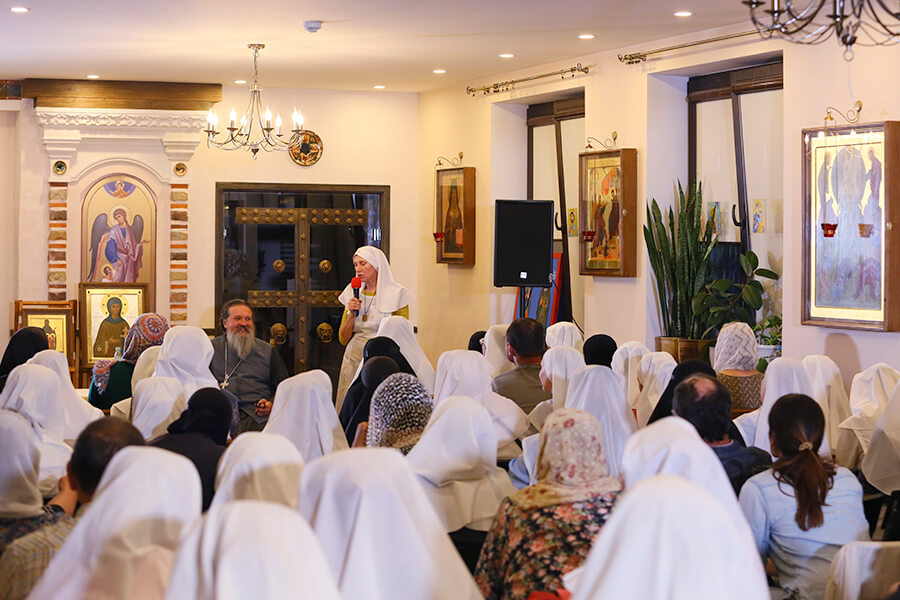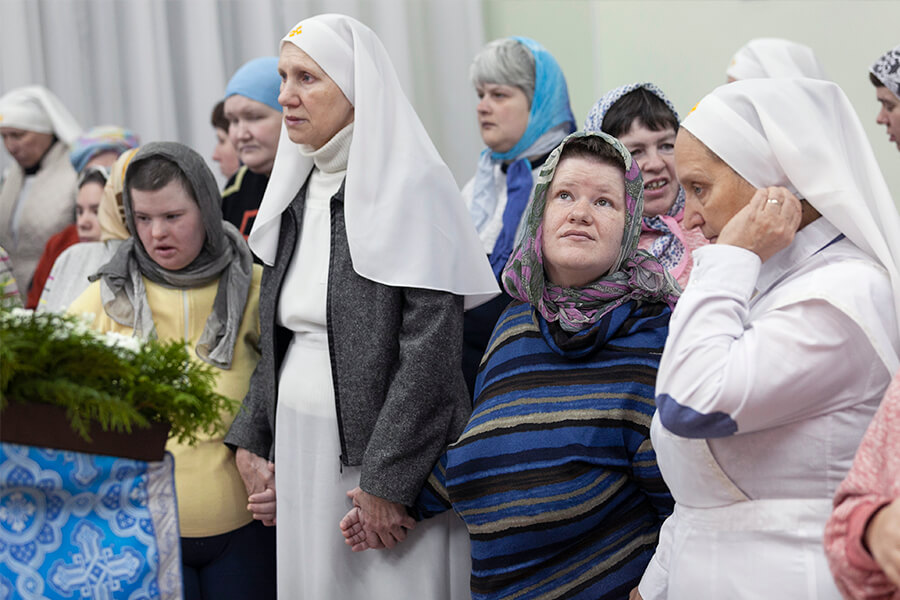
Raisa Shulga is one of the first twenty lay sisters of the Sisterhood in Honour of Saint Elisabeth. Behind her back is a quarter-century of involvement in a variety of obediences, including in hospitals, care homes, the church store and in the streets of the Belarusian capital. We asked her how her personal journey to God and the sorrows encountered along the way have influenced her ministry in the sisterhood.
It is the custom for Orthodox families to baptise children early in their lives. Yet we hear from many - especially in recent years – that this should happen at a later age to help an individual make a more considered choice. How would you respond to these arguments, given your experience of coming to God?
When I hear from people that it is best to wait, I disagree. God loves us all, and will also guide and protect people who have not been baptised. Yet I have always felt throughout my life the help and goodwill of my guardian angel whom I received at my baptism. I took baptism when I was one month old, and my guardian angel has always been with me since then.

As a child, I could spend hours looking at the sky. Few of my friends and relatives would share my pastime, so I was doing it alone. It must have been my guardian angel who hinted to me that there must be something beyond it. I heard it in the lines of a popular song: "Under the blue sky there stood a golden city". I now know that it was not the sky that I was looking to, but the reality above it.
I also attribute to my guardian angel my encounter with eternal life. From my childhood, I have kept fond memories of the time I spent with my great grandmother in the village. I lived with her until I was seven. I remember her as now - gentle, frail, clean, and wearing a white kerchief. She viewed the world as a kind and pure place, and she always spoke well of other people. When I was twelve, my grandmother had a blood stroke and was paralysed. I was torn between two desires. I wanted my grandmother's anguish to end, but I also did not want to lose her. When she died, I cried a lot. Forty days after her death, I was still in grief. And then I saw her in my dream. I dreamed that I had opened the door, entered her room, and my great grandmother was still sitting there the way I remembered her - in her white handkerchief and in a ray of the sun. "So you are still alive?" I asked. "Yes, I am. Do not worry, child," she replied. After that dream, I did not cry for her again. I knew that there was eternal life, and she was there.

I have had a health problem ever since my childhood. In the 1990s, various spiritual practices came into fashion, including those related to healing. Many were disoriented. I tried many. I experimented with Agni-yoga, I was reading Rerich and bathing in an ice-hole. One day, my grandmother remarked: "She is pouring cold water on herself. She must be faring badly." I then went into Agni-Yoga and lost a lot of weight. I was 170 centimetres and weighed only 54 kilograms. I had great difficulty walking up the stairs. The doctors could not do anything. But my guardian angel brought me to church, and I started taking communion. My troubles passed, and things returned to normal again.
You discovered God and were among the first sisters of charity from the newly-formed sisterhood of the Holy Martyr Elisabeth Romanov who took the blessing for their ministry from Metropolitan Philaret in December 1996. What do you remember about that day, and the choice of the sisterhood's patron saint?
We were looking forward to that day. Father Andrey Lemeshonok told us to have our vestments made. Together, we walked across the town for measurement. We also walked all our way back. We were feeling great grace and did feel like taking the bus. On 7 December, twenty sisters stood at the altar of the Cathedral of Sts. Peter and Paul. Metropolitan Philaret read the prayers. We approached him one by one to get his blessing. It was an amazing feeling. I felt like I was standing in heaven. I will always remember this day in this way. As for Saint Elisabeth... I remember my first encounter with her. I had read the story of her life in an Orthodox journal. I was struck by the purity of her spirit, her exceptional ability to forgive, and her readiness for self-sacrifice. The other sisters felt this way, too. So when the time came to choose a patron saint for the sisterhood, we chose her, because we wanted to serve others the way she did.

Father Andrey asked the sisters to wear icons with her depictions. I always have one when doing my obediences. One day, someone came up to me and asked for permission to touch the icon. Sometime later, he returned to me and said: "It is so powerful". That incident revealed to me the power of the saint. So when I put on my vestments and wear her icon, I feel as if I were a knight in full armour. This is also a way for God to strengthen my faith. I can imagine how much stronger the spiritual armour of the monastics must be. But they are under fire a lot more than I am.
You have been a part of the Convent's ministry as its lay sister for more than a quarter-century. You have served at hospitals and care homes, in the streets and in church stores. How have your discovery of God and the sorrows you encountered impacted your ministry?
On our way to God, we must expect temptations. By putting us through trials, God teaches us to trust him. I understand this very well. Our souls will wither without the sorrows. Without the sorrows, I would not have realised just how close God is to us or learned to understand people and sympathise with them. Sometimes, there is just no need for words. Your look and your compassion are enough - and they work on people directly. When you look someone in the eye and speak in plain and simple words, your souls become connected in unseen ways. The effect can be amazing and wondrous. The warmth and intimacy of such moments is something that is lacking in human communication nowadays, I think.

Soon after I took my blessing father Andrey told me: "It would be good if you began to visit the hospital to talk to the people there about the confession and the Communion." I listened and joined the two sisters who were already visiting the hospital wards. We would come after 5 pm and walk around the wards until late at night. One night, I entered a ward. As I was telling the men there about the robber on the cross, a young man of about 30 years asked me: Did God forgive the robber? We talked, and then Father Andrey came and the man took his confession.
Later father Andrey said: "A hardened robber has just confessed." He did not say anything else to keep the secrecy of the confession. God was disclosing to me, perhaps, the way he was acting to bring His message through.
Here is another incident I remember. I am visiting the wards and see a man looking for me. When he finally found me, he said: "Do you remember me? You gave me a church calendar nine years ago." We talked for two hours. He told me about his life. I thought it was amazing how a simple calendar that I gave a long time ago would begin a fabulous journey to God and His church under His guidance.
By that time, the children from the care home we were visiting had grown up and were transferred to an adult institution. Father Andrey gave us the blessing to visit it and help. The grown-up children recognised us from afar and were waving their hands in joy as we approached the building. What is it that we have done to deserve such a welcome, one might ask, We just hugged them, covered their heads, and patted them on their backs, but they received our attention as a precious gift. It was also a joy to us. One of the girls always said to us when we left, "You bring light with you when you come. Come as often as you can!"

I also remember my obedience at the church store at the University of Radioelectronics and Computer Engineering. I felt as if I was in the middle of a desert. It made me remember the accounts I had heard from the priests at the time of the empty churches in the Soviet Union. They told us how difficult it was to pray without any people. There were three of us there, and we felt the same thing. Yet the Lord was filling me with joy so much that I felt as if I was standing in a church.
A student came up to me once and asked, "What is this church store for?" Another one standing next to him remarked: "I do not go to church, either, but if the stars are shining, then somebody must need them." That incident taught me one thing: our spirit grows in the same way as we do, through trial, error and doubt. It is best to allow things to go their course, naturally and sequentially.
How do you feel the presence of God and His help as you pursue your ministry?
Many proverbs describe this. "Salvation is God's reward for patience", or "Hard work does not go unrecognised". God always helps and leads us to salvation. I feel this when I hear from the people who pass me by in the streets: "It is so good that you are standing here! I am happy to see you!" Does it make any difference if it is you or somebody else standing there? It does for God because he meant you to be there.

Minsk if full of different people. I went to the same school as some, the same university as others. I have worked together with many, but I do not see any of them here. It is a great blessing that God had called me here and brought me to faith without sending me the sorrows I could not bear. The sisterhood and the convent are my way, my life and my meaning to it. To me, coming to the Convent feels like entering Jerusalem in heaven. Here, I feel complete and fulfilled. The Divine Liturgy is like heaven on earth. He had a reason to bring us together here. Without Him, nothing else would matter. My faith is my precious gem.